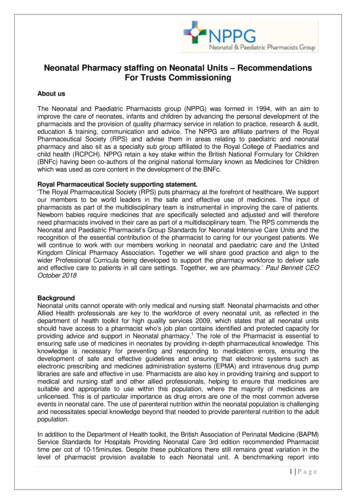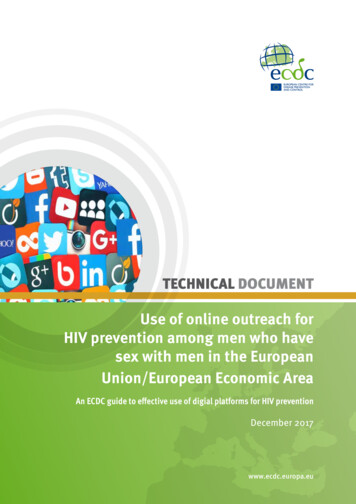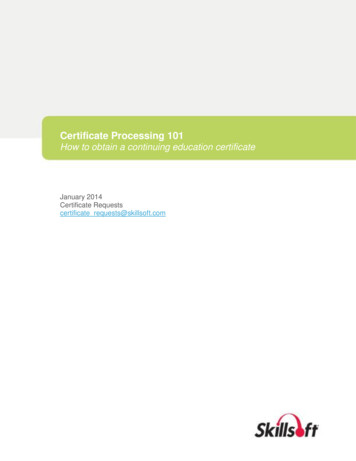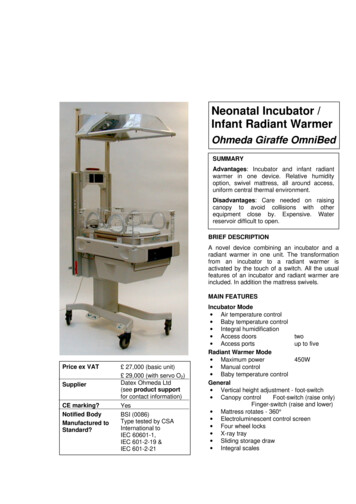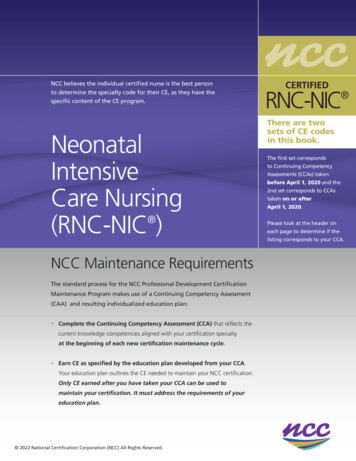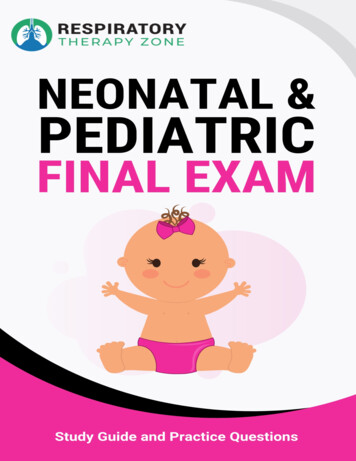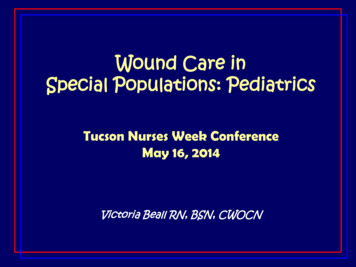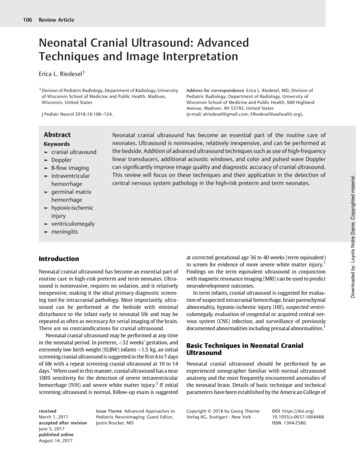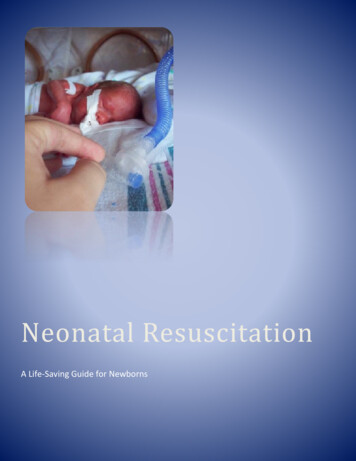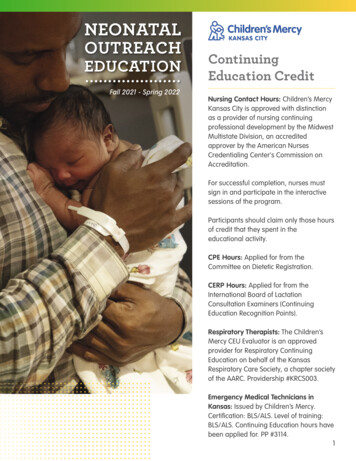
Transcription
NEONATALOUTREACHEDUCATIONFall 2021 - Spring 2022ContinuingEducation CreditNursing Contact Hours: Children’s MercyKansas City is approved with distinctionas a provider of nursing continuingprofessional development by the MidwestMultistate Division, an accreditedapprover by the American NursesCredentialing Center's Commission onAccreditation.For successful completion, nurses mustsign in and participate in the interactivesessions of the program.Participants should claim only those hoursof credit that they spent in theeducational activity.CPE Hours: Applied for from theCommittee on Dietetic Registration.CERP Hours: Applied for from theInternational Board of LactationConsultation Examiners (ContinuingEducation Recognition Points).Respiratory Therapists: The Children’sMercy CEU Evaluator is an approvedprovider for Respiratory ContinuingEducation on behalf of the KansasRespiratory Care Society, a chapter societyof the AARC. Providership #KRCS003.Emergency Medical Technicians inKansas: Issued by Children’s Mercy.Certification: BLS/ALS. Level of training:BLS/ALS. Continuing Education hours havebeen applied for. PP #3114.1
CoordinatorPatricia A. Reuter, MSN, RNC-NIC, is the NeonatalOutreach Education Coordinator at Children’s Mercy. Shereceived a diploma in nursing from Saint Luke’s Schoolof Nursing, Sioux City, Iowa; a bachelor’s of science innursing from Bowling Green State University, Ohio; anda master’s of science in nursing (perinatal clinical nursespecialist tract with a focus on education) from the MedicalCollege of Ohio, Toledo. Certifications include certificationthrough National Certification Corporation (NCC) CertifiedNeonatal Intensive Care Nurse and a Pediatric BioethicsCertification. Patricia’s areas of expertise includecoordination of education programs for perinatal healthcare professionals, neonatal nurse resource for communityhealth care providers in the region, care of parents andethical issues.To learn more about the NeonatalOutreach Program, go to:childrensmercy.org/neonatalor contact Patricia Reuter at:Telephone: (816) 234-1602Email: preuter@cmh.eduSAVE THE DATE: FRIDAY, APRIL 29, 20228th Annual Regional Neonatal Conference:Decision-making for Optimal Care and OutcomesPlease use your phone camera to scan theQR code to register online.OR visit: childrensmercy.org/neonatalQuestions?Contact Patricia Reuter at:Telephone: (816) 234-1602 Email: preuter@cmh.edu2
Table of ContentsIntroduction 4Physical Exam and Gestational Age Assessment 5S.T.A.B.L.E. Program 6Cardiac Module 8NRP (Neonatal Resuscitation Program) 9Simulation: Neonatal Stabilization Scenarios 10Fetal Monitoring Course 11Lactation 12Consultative Services, On-Site Assessment 13Perinatal Continuing Education Program 13Neonatal Topic Presentations 14Hands-on Procedures/Skills 15Map 16Registration 173
IntroductionThe Neonatal Outreach Education Program at Children’s Mercy is designed to promotethe education of the region’s health care professionals and public about neonatal andperinatal care.Participation in the program begins with an on-site assessment of the community hospitalto identify educational needs of the staff. Following the visit, an individualized curriculum,in accordance with the staff’s strengths and educational needs, is developed. We offerdidactic as well as clinical skills programs and simulation. The program is evaluatedthrough ongoing assessments that result in further program development. Immediateconsultation with Children’s Mercy physicians, nurses, nutritionists, respiratory therapists,pharmacists, social workers and other staff is available on an ongoing basis.GOALS Educate professional staff regarding comprehensive neonatal-perinatal care. Educate the public to promote optimal newborn health. Develop individualized teaching programs for community hospital personnel.4
Physical Exam and Gestational AgeAssessment of the Newborn, 3rd EditionThis updated, 3rd edition course is highly visual and unique. The gestational ageassessment component is based on the Ballard exam. Participants will see how to applydifferent scoring categories by taking a close-up look at preterm through term infants. Thephysical exam component is a thorough look at the neonate from head to toe. Both normaland abnormal findings are presented. Numerous photos, illustrations and animationsmake difficult concepts easy to understand for all levels of learners.Contact Patricia Reuter by email at preuter@cmh.edu to schedule a course atyour hospital. Include several dates that you have room availability. A minimum of 10participants is required for the course. Inviting professionals from area hospitals isencouraged if needed to meet this minimum.This education activity awards up to 6.7 nursing contact hours.This education activity awards up to 8.1 hours of Kansas Respiratory ContinuingEducation.Fee: 400 (Flat fee for a minimum of 10 participants, includes slide handouts, completephysical exam of the newborn worksheet and continuing education credit).5
The S.T.A.B.L.E. Program,Learner CourseThe S.T.A.B.L.E. Program is the most widely utilized and implemented pre-transport/post-resuscitation stabilization educational and clinical tool that has been implementedthroughout the U.S. and in many regions worldwide. “S.T.A.B.L.E.” stands for the sixprogram modules: Sugar and Safe care, Temperature, Airway, Blood pressure, Lab workand Emotional support for the family. A seventh module, Quality Improvement, stressesthe professional responsibility of improving and evaluating care provided to sick infants.Neonatal assessment and stabilization guidelines are offered in each module. Preventionof adverse events and delivery of safe patient care are stressed throughout the program.Stabilization is a team effort! Therefore, any health care provider involved with postresuscitation and/or pre-transport stabilization care of sick neonates would benefit fromthe S.T.A.B.L.E. Program curriculum. This includes: physicians, registered nurses, midwives,advanced practice registered nurses, licensed practical nurses, nursing assistants,respiratory therapists and pre-hospital providers (emergency medical technicians andparamedics).Contact Patricia Reuter by phone at (816) 234-1602 or email at preuter@cmh.edu to schedule acourse at your hospital. Include several dates that you have room availability. A minimumof 10 participants is required for the course. Inviting professionals from area hospitals isencouraged if needed to meet this minimum. Sixth Edition Learner Manuals are ordered byeach institution.Up to two courses per year will be offered to all basic (Level 1) and specialty (Levels 2 and 3)hospitals; however, please contact us to find out if an area hospital is sponsoring a course.6
The S.T.A.B.L.E. Program, Learner Course(cont.)All courses may be offered virtually with a maximum of 12 participants. This is offered via aMicrosoft Teams Meeting.This education activity awards up to 7.6 nursing contact hours.This education activity awards up to 9.2 hours of Kansas RespiratoryContinuing Education.This education activity awards up to 7.3 hours of Emergency Medical TechniciansEducation in Kansas and Missouri.Please contact Patricia A. Reuter, MSN, RNC-NIC, Coordinator, Neonatal OutreachEducation, for pricing and to register or schedule a course foryour facility.Telephone: (816) 234-1602 Email: preuter@cmh.edu7
Cardiac ModuleThe S.T.A.B.L.E. Cardiac Module 2nd ed. Program provides general guidelines for theassessment and stabilization of neonates with suspected, severe forms of congenital heartdisease (CHD). Prompt, effective and appropriate care of neonates with severe CHD canreduce secondary organ damage, improve short- and long-term outcomes, and reducemorbidity and mortality. Common palliative and surgical treatment options will also beexplained.This information is presented in a highly visual format using an animated slidepresentation, and is divided into three sections:Part 1: Physical exam of neonates with suspected CHD.Part 2: Review of the anatomic features, clinical presentation and initial stabilization ofneonates with severe forms of CHD.Part 3: Modifications to the six S.T.A.B.L.E. assessment components that are necessarywhen caring for neonates with CHD.8 a.m. – 5:30 p.m.Thursday, May 26, 2022Professional Office Building at Adele Hall, Children’s MercyContinuing Education:This education activity awards up to 7.25 nursing contact hours.This education activity awards up to 8.7 hours of Kansas RespiratoryContinuing Education.Fee: 50 (Book not included in fee).(Must also have current book—to order, go to stableprogram.org/shop/ and purchaseS.T.A.B.L.E.-Cardiac Module Manual, 2nd edition, 64.95 current price).8
NRP (Neonatal Resuscitation Program)This course is designed for health care professionals involved in any aspect of neonatalresuscitation, both those taking NRP for the first time and those renewing. While this coursedoes not guarantee proficiency during an actual resuscitation, it lays the foundation ofknowledge, technical skills, teamwork and communication skills that enable participantsto continue development of neonatal resuscitation skills. Participants need to self-study theNRP textbook and complete all online coursework prior to the in-person course.For more information, please go to aap.org/nrp. Time at the in-person course willfocus on hands-on learning for practicing skills, integrated skills stations for evaluation,immersive simulations and constructive debriefings. The simulation, including a debriefingcomponent, is used primarily to improve teamwork and communication.For course availability and details on versions offered, please contact the Children’s MercySimulation Team at nrp@cmh.edu or call (816) 302-0218.Contact hours are offered by the American Academy of Pediatrics upon completion of theonline NRP examination.Additional fee(s): online examination fee incurred at aap.org/nrp (employees of Children’sMercy should contact nrp@cmh.edu for details pertaining to NRP).Please contact: Simulation Team at nrp@cmh.edu or (816) 302-0218.9
Simulation: NeonatalStabilization ScenariosNeonatal Outreach Education, in conjunction with the Center for Pediatric Simulation,provides simulation experiences focused on the stabilization of premature and sickneonates. These simulations are designed to involve inter-professional teams by recreatinghigh-risk scenarios in neonatal care environments. Neonatal simulation scenarios will bedeveloped for your facility by the Center for Pediatric Simulation and our neonatologiststo meet your team’s needs. High-fidelity simulation provides your team with practice ina safe learning environment through interactive scenarios and debriefing. Scenarios areconducted with the use of high-fidelity mannequins that enhance scenario realism. Thesessions are facilitated by a team of simulation experts and a neonatologist.To schedule this comprehensive three- to four-hour simulation session atyour facility with our team, please complete a request for simulation services(https://cmkc.link/CMHSimulationRequest). A member from the Center forPediatric Simulation will then contact you and gather specific information about yourneeds. A minimum of five and maximum of 10 inter-professional participants are requiredfor the simulation. Participation of a provider who can perform and/or direct all aspects ofstabilization including intubation, placement of umbilical lines and ordering of medicationsis highly encouraged to protect the realism of the simulation. If this is not possible, pleasecontact the Simulation Team so modifications can be made. Successful completion ofthe NRP (Neonatal Resuscitation Program) Provider Course and the S.T.A.B.L.E. ProgramLearner Course are recommended and encouraged for the best simulation experience.For questions regarding this course, please contact the Simulation Team atsimteam@cmh.edu or call (816) 302-0218. Due to the effects of the Covid-19 pandemic,scheduling these simulations is delayed. Please contact our team for details.10
Fetal Monitoring CourseIntermediate Fetal Monitoring Course (one-day class)This 7th Edition course consists of an online learning prerequisite education and a oneday instructor-led course. Skills taught and knowledge assessed include: Maternal and fetal physiologyInterpretation of fetal and uterine monitor tracingsEvaluation of auscultated fetal heart soundsLeopold’s ManeuversPlacement of fetal spiral electrodes and intrauterine pressure cathetersEvaluation of and strategies for enhancing communicationThis course is presented to approximately 15,000 clinicians annually and may be used as acompetency assessment to validate the knowledge and skills of perinatal clinicians who utilizefetal monitoring and includes a post-test to assess learner knowledge.Dates: April 4, 2022Contact Hours: 18.0 contact hours are offered by AWHONN (The Association of Women’sHealth, Obstetric and Neonatal Nurses) upon completion of the course.Fee: Intermediate two-day course: 225 (This includes workbook and testing materials).For questions, contact: Amy Hemme, MSN, RNC-OB, Education coordinator, Fetal HealthCenter, (816) 234-9338, ajhemme@cmh.edu.Advanced Fetal Monitoring Course (one-day class)Advanced Fetal Monitoring is an eight-hour course designed for the experienced clinicianwho has previously completed an Intermediate Fetal Monitoring Course. This oneday instructor-led course, which was revised in 2017, is designed to prepare perinatalclinicians to care for patients with complex fetal heart monitoring tracing. Coursecomponents include: Complex case studies that include recommended interventionsCommunicating with colleaguesAdvanced principles of maternal-fetal physiologyLocation: All classes will be held at Children’s Mercy Kansas City,2420 Pershing Road (room TBD)Date: May 17, 2022Contact Hours: 8.0 contact hours are offered by AWHONN (The Association of Women’sHealth, Obstetric and Neonatal Nurses) upon completion of the course.Fee: Advanced one-day course: 200 (This includes workbook and testing materials).For questions, contact: Amy Hemme, MSN, RNC-OB, Education coordinator,Fetal Health Center, (816) 234-9338, ajhemme@cmh.edu.11
LactationThe mission of Breastfeeding Counselor Certification is to recognize excellence in thespecialty role of the nurse lactation counselor. All Prepared Childbirth Educators Inc. (PCE)certifications are on the American Nurses Credentialing Center (ANCC) inclusion list ofaccepted national certifications regarding Magnet status. This list can be found athttps://www.nursingworld.org/ancc/.REQUIREMENTS: Current active nursing license and one year working with lactatingwomen OR an approved lactation course. This two-day course fulfills the requirement.CONTENT: This two-day program follows the Baby Friendly Hospital Initiative outline andwill cover relevant, research-based topics such as: the role of the health care professional,anatomy and physiology of breast, latch and suck assessment, guidelines for the first weekof life, nutritional needs of the nursing dyad, management of common problems, specialneeds (i.e. prematurity, late preterm, multiples, cleft lip/plate, neurological problems andre-lactation), medications, lactation aids, supporting and empowering women and theirinfants.Live Virtual Zoom Breastfeeding Counselor Prep Course: “Breastfeeding- Beyond theBasics” - childbirth education *Purchase of the Live Virtual Zoom Prep Course doesnot include the certification examination. The certification exam is a separate optionalpurchase – more information below.* childbirtheducation.orgThe course is offered once a month. The cost of the course and the certificationexam is 450. The exam must be proctored by a professional at management level orhigher, (i.e., a nursing supervisor, manager or education lead), it cannot be aco-worker or colleague. You can also take the test at a testing center. Please visitthe PCE website for further information on the course and exam.Contact Hours: 16 nursing contact hours/L-CERPs for the two-day breastfeeding course,which means that the curriculum has been review approved by the Pennsylvania StateNurses Association, which is part of the ANCC system.PCE is also a continuing education provider through the California State Board of Nursing.The course is reviewed and approved annually by the International Board of LactationConsultant Examiners.DATES and TIMES: 2022 dates TBD. Children’s Mercy employees will be expected to takethe one-hour certification exam that is given during the two weeks followingthe course).LOCATION: Course will be virtual. Required exam will be administered during the twoweeks following the course. Staff will need to sign up for the exam prior to course dates.Multiple dates and times will be available for exam.12
Lactation (cont.)FEE: Outside participants may sign up for the course e-basics/.Free to all Children’s Mercy personnel – Sign up in Cornerstone. Watch emailand Daily E-news for course announcement.*If the course is full, you may request to be put on a wait list.*For questions, contact: Kyla Galate, RN, BSN, RNC-NIC, IBCLCLactation Services, kygalate@cmh.edu.childrensmercy.org/neonatalTo speak with a lactation consultant, please call Lactation Help Line at (816) 346-1309.Consultative ServicesOn-site AssessmentClinical consultations are available to all primary health care providers in the region.Consultations (by phone or on-site) are provided regarding the current management ofhigh-risk mothers and neonates and/or equipment.On-site assessment of equipment, services and/or staff is available upon request.Perinatal Continuing Education Program(PCEP)This is a comprehensive program that is useful in the daily work of physicians, nurses andother personnel who care for pregnant women and/or newborns. In keeping with the timeand personnel limitations most hospitals experience, program activities take place withineach participatory hospital. In addition to cognitive information and skill instruction, PCEPis also an educational process that engages all perinatal core providers and includes toolsfor resource assessment, competency evaluation and risk reduction. PCEP offers efficient,economical and effective perinatal education.This program has proven to increase cognitive knowledge and improve patient care.For more information about this course, please go to med.virginia.edu/cme/pcep/.If your institution is interested in participating, please contact Patricia Reuter atpreuter@cmh.edu or call (816) 234-1602.13
Neonatal Topic PresentationsSpecific presentations are designed to meet the needs of individual agencies as requested.Our outreach team works with you to design a presentation to reflect your unique interestsand meet your scheduling needs. Presentations are offered at your facility or the locationyou request.Respiratory Disorders Affecting the Neonate: Stabilization of the Neonate for Transport Perinatal Asphyxia/Neonatal Depression Meconium Aspiration: Prevention and Management Respiratory Distress Physiology of Normal Respiration Oxygen Administration and Monitoring Acid/Base Balance Neonatal ResuscitationCongenital Anomalies: Management of Infant with Congenital Malformations Inherited Congenital Defects Surgical Emergencies of the Neonate Cleft Lip/Palate and Feeding IssuesComplications in the Neonatal Period: Perinatal Viral Infections Perinatal Bacterial Infections Neonatal Seizures Intracranial Hemorrhage Care for the Small-for-Gestational-Age Newborn The Premature Infant Perinatal Substance Abuse Neural Tube Defects Cardiac Defects in the Newborn Care of the Diabetic Mother’s Infant Outcome of the Very Low Birth Weight Infant Hyperbilirubinemia Hypoglycemia: Diagnosis and TreatmentManagement of Neonatal Loss: Sudden Infant Death Syndrome (SIDS) Perinatal Morbidity and Mortality Perinatal Loss and Grief14
Diagnostic and Therapeutic Procedures: Assessment of Basic Neonatal Care Antenatal Fetal Evaluation Temperature Regulation Infant Nutrition Breastfeeding Update Difficulties with Breast and Bottle Feeding Neonatal Pharmacologic Agents Neonatal Lab Values Fluids, Electrolytes and Renal Function of the Neonate Monitoring in the Special Care Nursery Screening for Congenital Metabolic, Endocrine and Hemoglobin Disorders Physical and Gestational Age Assessment of the Newborn Pain Management for Newborns Basic X-ray Interpretation Developmental Care Therapeutic HypothermiaHands-On Procedures/Skills Heating and Humidifying on Oxygen/Air MixtureMeasuring Oxygen ConcentrationMixing Oxygen and Compressed AirPeripheral Arterial Blood Gas SamplingPeripheral IV Insertion and Taping the IVPositive Pressure Ventilation with Bag and Mask or T-Piece ResuscitatorEndotracheal Intubation Assisting, Verifying Placement and Securing ET TubeUmbilical Venous Catheter InsertionUmbilical Artery Catheter InsertionPneumothorax Evacuation: Needle Aspiration of the ChestPneumothorax Evacuation: Chest Tube InsertionScreening Newborns for Critical Congenital Heart Disease (CCHD) Using PulseOximetryFor topic presentation requests, a minimum of 10 participants is required. For skills, aminimum of five and a maximum of 20 participants per session are required.If you are interested in any of the topics, please contact Patricia Reuter at (816) 234-1602 orpreuter@cmh.edu.15
MapIn the event of roads closing/detours, please visit our website for the latest 's Mercy Kansas City2401 Gillham RoadKansas City, MO 6410816
RegistrationPlease use your phone camera to scan theQR code to register online.OR visit: childrensmercy.org/neonatalQuestions?Contact Patricia Reuter at:Telephone: (816) 234-1602 Email: preuter@cmh.eduSAVE THE DATE8th Annual Regional Neonatal Conference:DECISION-MAKING FOROPTIMAL CARE AND OUTCOMESFRIDAY, APRIL 29, 2022Virtual OfferingThis full-day conference is intended for thoseclinicians who participate in the care of neonates.For conference details and registration, pleasevisit childrensmercy.org/neonatal22-NEO-1087Copyright 2022 The Children’s Mercy Hospital. All rights reserved.EOE Employer/Disabled/VET. 22-NEO-0695. 1/22.17
Intermediate Fetal Monitoring Course (one-day class) This 7th Edition course consists of an online learning prerequisite education and a one-day instructor-led course. Skills taught and knowledge assessed include: Maternal and fetal physiology Interpretation of fetal and uterine monitor tracings Evaluation of auscultated fetal heart .
